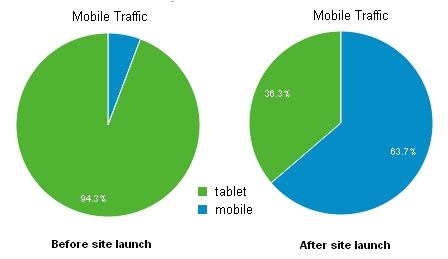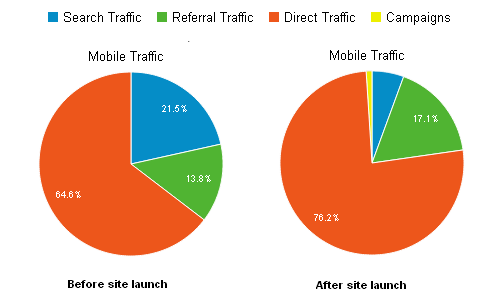| Aug 7, 2013
Where is my Organic Search Traffic?
Comparing last four months of pre-launch and post-launch analytics data of recently launched responsive website for a client, revealed some interesting insights.
- Website traffic remained unchanged
- Share of Mobile traffic increased
- Share of Direct traffic increased
- Shift in Desktop traffic to Mobile
Overall, for the new website, traffic visit numbers remained relatively unchanged. However, the share of desktop users dropped giving a huge boost to visits from mobile users — increasing their share from 7% to 25% of total site traffic. As shown in the chart below, the old site was not friendly to small mobile device users as majority of the mobile visits were from tablets. With the new responsive website, non-tablet mobile traffic growth was significant and for the first time it was almost twice of the tablet users. It is evident from the following chart that the new responsive website is a huge success.
Now with significant traffic coming from Mobile devices, it was natural to compare traffic sources for this segment before and after the site launch. Analytics reports showed a higher increase in share of direct visits and a lower number of search related visits for mobile traffic, as shown in the chart below.
On further drilling down, the mobile devices report showed the new website gained huge traction with iPhone users, majority of whom were on the latest iOS6 operating system. This large segment of iPhone users were the cause of the increase in direct visits, as a result of Apple’s decision to use Google’s encrypted search in the Safari browser search box in the iOS6 operating system.

As a protocol, moving between encrypted and non-encrypted urls, suppresses referrer information.
For majority of the newly acquired mobile users, search referrer data vanished. In the absence of referrer data, all Google search engine related visits are now recorded as ‘Direct’ visits. However paid searches remain unaffected.
This problem is not confined to Apple’s iOS6. Android versions 4.0+ also use encrypted Google Search by default when using the Android search box and so does Firefox on Android. Chrome on iOS6 and Android uses standard Google Search. Mark Ballard, Director of Research at RKG has written detailed posts on this issue. In his opinion, the search traffic share lost from iPhone could be as high as 15% for some websites as a result of very high adoption rate for iO6 updates.
Secure search is not confined to mobile device or browsers. On desktops, Google enables https protocol for its search engine if a user is logged in to any other Google application. Firefox v.14.0+ also use Google’s encrypted search. This is Google’s attempt to make the search secure and web faster. At present there are three kinds of Google searches.
- Standard searches where referrer and search term is provided.
- Secure searches where referrer is provided but search term is not.
- Encrypted searches where referrer and search term are not provided.
Adoption of secure searches by desktop and mobile devices will continue to cause analytics data corruption. Loss of keywords and Search Engine data has implication for traditional measuring and reporting on SEO efforts for online marketer. As a result, traffic attribution reports in analytics packages are now under reporting Organic Search visits and affected traffic is now reported as part of direct traffic.


